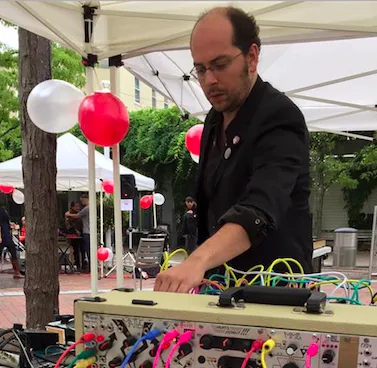Visiting Instructor Quinn Collins

Visiting Instructor Quinn Collins
According to Music Technology Professor Quinn Collins, “There's no reason a [college] course shouldn't be fun.” Equipped with a computer program, keyboard controller, and headphones, students in “Introduction to Music Technology” (MUSI003A) get the chance to learn the techniques of modern production. The lottery for the class is competitive, usually filled by upperclassmen, and Collins attributes this popularity to the unique nature of the course.
The class has no prerequisites, and students are allowed to explore any aesthetic with their work so long as it checks off the required skills for each assignment. Usually in class, “I demonstrate something and then I let them work on it and come around and check [in],” says Collins. Although his lessons are on introductory level skills, “the sky’s the limit” for how far students can take their work.
As an artist, music technology and improvisation are central to Collins’ creative process. Using turntables, modular synthesizers, and samplers, he performs with various groups, including the duo llama/lama. Along with fellow improviser and sound artist Paul Schuette, Collins improvises on modular synthesizers and edits the recordings to make genre-bending compositions. “It's twisted, it doesn't sound like standard drum and bass, but that's the starting point—we go from there.” In another group called the Miz’Ries, Collins says, “I usually do live musique concrète with a turntable and a sampler.” Musique concrète is a technique of incorporating found sound recordings into compositions that he both practices and teaches.
One of the first assignments Collins tasks his students with each semester is to make a musique concrète collage. Some students find “creative ways in which they might break the rules I impose on them, and I find that quite interesting,” Collins says. One student captured a recording of Collins speaking in class and included it in his musique concrète piece.
Collins embraces rebellion both in his classroom and personal work. He started playing classical piano early in his life, but remembers, “What really drew me into music was when I [was] 13 years old, and got my first electric guitar.” Alternative rock, indie rock, and punk were the main influence of Collins’s childhood in the 1990s. His interests lived in two different worlds, and in college he felt pressure to pursue contemporary classical music while leaving rock behind. However, he found a way to bridge the two when he met his teacher and mentor Michael Fiday, and started drawing inspiration from the subversive Dutch composer Louis Andriesson.
“[Andriesson] was interested in disrupting divisions between this idea of high and low art and he did it really well.” Studying his work, “felt like a revolution,” says Collins. Looking back, Collins’ is surprised he didn’t come to the conclusion sooner. “[It] should have been obvious that those distinctions don’t matter so much.”
As for his own style, he says, “I hesitate to use genre names because I think they are superficial . . . part of the reason to make music is to do what words can't do.” The words he would use to describe his aesthetic are visceral, and oftentimes loud: “That's something I have always done and always will continue to do.”
After graduating from the College Conservatory of Music at the University of Cincinnati in 2005 with a degree in composition, Collins attended the Young Composers Meeting in the Netherlands, and the Bang on a Can summer institute, where he had formative experiences meeting like-minded musicians. In 2007, Collins went on to complete his masters at the Experimental Music Studios of the University of Illinois Urbana-Champaign. There, he found “rich history, beautiful studios, great teachers, and a great sense of community.”
“A friend of mine said there may be more composers per capita in the Urbana-Champaign area than anywhere else in the world.” Says Collins. The Experimental Music Studios are the “oldest continuously operating electronic music studios in the western hemisphere, founded in 1958.” Illinois was at the center of classical experimental music in the 60s and 70s, and later in 2007, Collins found it to be a historically “polemical place” with a signature sound coming out of its studios. “It wasn't my aesthetic, but learning it taught me a lot that I was able to apply to other things once I was freed up to do it my own way,” Collins reflects. At the time, he was making post-minimalist music by taking “techniques from early minimalism but opening up to a wider range of possibilities. One of those [was] using a more dissonant vocabulary.”
Collins is now finishing his PhD dissertation in composition at Princeton University, which consists of a composition and analytical essay. Inspired by Richard Brautigan’s novella Trout Fishing in America, Collins says the composition is “a multi movement piece for percussion quartet and electronics called ‘Precious and Intelligent Metal.’” This modern twist on classical composition is accompanied by a critical analysis of a 90s alternative rock band. Collins’ essay is an analysis of Sonic Youth’s 1987 album, Sister, and their unconventional guitar tunings, which he recreates on his own guitar.
Collins’ approach to art embodies the adventurous, interdisciplinary spirit of learning here at Swarthmore. His ability to mix sound using both classical and experimental techniques, and disrupt the boundaries between high and low art comes from years of learning from a range of composers and experimenting with his own sound. He is a professor, but more importantly, an artist whose perspective inspires a younger generation to enjoy making music—regardless of whether they’ve had any experience prior to stepping into his class.



